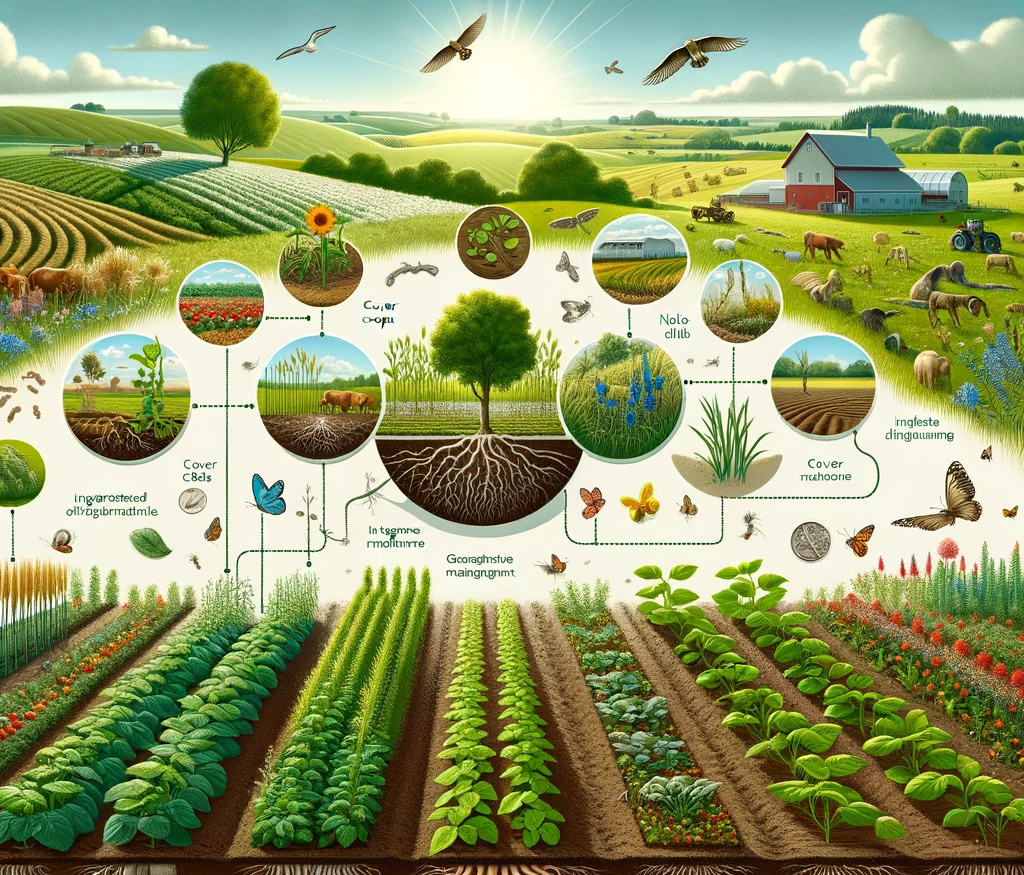Regenerative agriculture has surged to prominence in contemporary discourse concerning sustainable practices. Rooted in a synergy between the ecosystem and agricultural production, this paradigm echoes Bahá’í teachings about the interconnectedness of humanity and the natural world. The Bahá’í Faith emphasizes unity and stewardship—a doctrine that seamlessly resonates with the principles governing regenerative agriculture. This article elucidates the core tenets of regenerative agriculture while exploring its potential to act as a transformative force for global change.
At its essence, regenerative agriculture aims to restore and enhance the vitality of soil health, biodiversity, and ecosystem balance. Unlike conventional agricultural methods that often deplete soil nutrients and diminish biodiversity, regenerative practices foster a holistic approach. This perspective is intricately linked to the Bahá’í view of the earth as a shared trust, highlighting the moral obligation to nurture the land for future generations. The interplay between human activity and environmental sustainability is an acknowledgment of the interconnectedness that Bahá’í teachings espouse.
Central to regenerative agriculture is the practice of soil regeneration, which serves as a cornerstone for fostering healthy ecosystems. Techniques such as cover cropping, crop rotation, and reduced tillage are employed to enhance soil organic matter and improve water retention. This method not only soil health but also boosts crop resilience against climatic extremes. The Bahá’í viewpoint champions such methodologies, recognizing the need for responsible stewardship of Earth’s resources. Consequently, by indulging in regenerative practices, humanity fulfills its divine mandate to act as trustees of the planet.
Another foundational aspect of regenerative agriculture is biodiversity. The divergence from monoculture—the cultivation of a single crop over large areas—provides an opportunity to create more resilient ecosystems. Companion planting and agroforestry systems promote diversity and ecological balance. This is where Bahá’í teachings find harmonization; the faith elevates the importance of diversity amongst humankind, reflecting that just as diverse cultures enrich civilization, biodiverse ecosystems are essential for the health of our planet.
Water management is yet another critical element within the discourse of regenerative practices. Approaches such as permaculture design and contour farming mitigate soil erosion and enhance water retention. This practice correlates with the Bahá’í principle of equity, emphasizing the fair allocation of resources. Regenerative agriculture empowers farmers to cultivate without depleting water resources, subsequently supporting equitable access to clean water—a crucial human right that aligns with Bahá’í values.
In examining the socioeconomic implications, regenerative agriculture also emerges as a catalyst for equitable economic development. By fostering local food systems, these practices can bolster community resilience and vitality. Farmers engaging in regenerative practices often tend to be more adaptive and innovative, leading to enhanced food sovereignty. The Bahá’í principle of the oneness of humanity elucidates the need for socioeconomic justice; as such, promoting regenerative agriculture can serve as a pathway to alleviate poverty and hunger, further serving the collective advancement of society.
The adoption of regenerative practices can be examined through the lens of community engagement. The collaborative nature of regenerative agriculture encourages knowledge sharing and mutual support. Farmers are encouraged to coalescence, create cooperatives, and engage with local communities to establish a sustainable food ecosystem. This facet of regenerative agriculture mirrors Bahá’í teachings on consultation and collective decision-making, reinforcing the notion that collaborative efforts yield more prosperous outcomes than individual endeavors.
Education plays a pivotal role in nurturing the principles of regenerative agriculture. Continued education on sustainable practices equips farmers and consumers alike with the requisite knowledge to make informed decisions. Workshops, seminars, and demonstration farms serve as platforms for disseminating critical information, thereby fostering a culture of learning and growth. The Bahá’í emphasis on education aligns well with this necessity; it fosters an informed populace that is equipped to undertake the stewardship necessary for environmental sustainability.
Moreover, regenerative agriculture can contribute positively to combating climate change. The practices associated with soil restoration allow for carbon sequestration, inherently reducing the atmospheric CO2 levels that contribute to global warming. This strategic response to climate issues aligns with the Bahá’í commitment to environmental sustainability. Harnessing the potential of nature’s own systems, regenerative agriculture not only addresses climate change but also enhances the overall well-being of the planet.
In conclusion, the principles inherent in regenerative agriculture resonate profoundly with Bahá’í teachings. As a compelling counter-narrative to the prevailing extractive agricultural paradigms, regenerative practices serve as harbingers of hope, illustrating that harmony between humankind and the environment is achievable. By embracing soil health, biodiversity, equitable resource management, and community engagement, regenerative agriculture stands as a force for positive transformation. The Bahá’í teachings guide individuals to recognize their responsibilities as stewards, reinforcing the idea that a commitment to sustainable agriculture is not merely a choice, but a profound moral directive in the pursuit of unity and progress in the world. Through regenerative agriculture, we may cultivate not only a thriving planet but a just and equitable society for generations to come.
